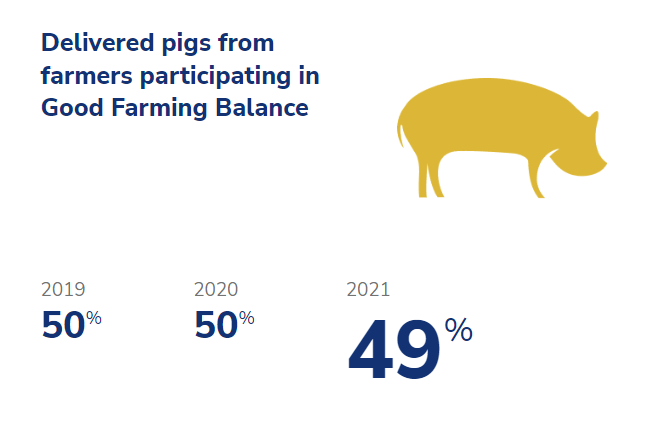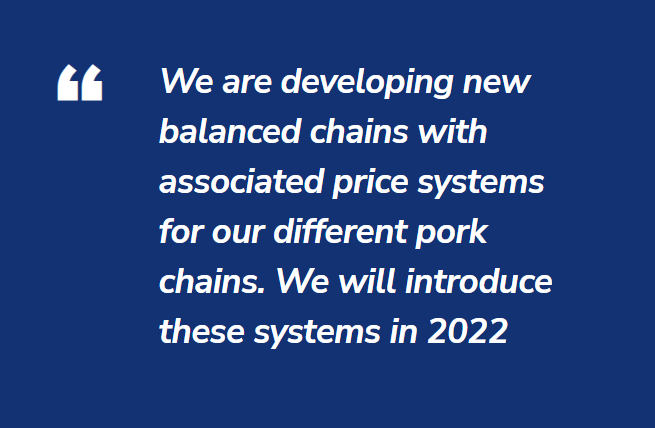Fair prices are important for stability in the supply chain and therefore ultimately important for all supply chain partners. As a central player in the supply chains, we have an influence on their structural development. We also work to support a fair distribution of value in the production supply chain and to steer volatility.
Fair prices have an impact on all parties in the supply chain and can only be achieved with the cooperation of the important parties involved. We therefore cooperate intensively with both our customers (retail, processors, and food services) and farmers to develop innovative and sustainable pricing models. The main focus of our efforts is on the farmers because the traditional pig cycle has the most impact on them.
Traditionally, cow prices and especially pig prices are volatile. Typical for the pig market are a short-term focus and fluctuating demand and supply, which influences spot price levels with traders dominating the international market. A more predictable supply of animals and less price volatility are in the interests of all parties in the supply chain so that they can manage their risks.
A short payment term is important for farmers. Sedef pays its farmers within a short time frame, thereby helping alleviate the working capital situation at the farmers’ level.
Another important topic is the way value is distributed among supply chain partners, which is significantly influenced by the market. We want to make sure that every supply chain partner earns enough money to be able to run their business. For us, ‘fair’ means that no individual party earns excessively more than other parties in the supply chain. If there is an imbalance, it is generally not good for the supply chain’s continuity.
Sedef is committed to improving its pricing and contracting models, both in order to support a fair distribution of value in the production supply chain, and to avoid volatility related to the traditional pig cycle. This includes the purchase pricing of animals, which supports the success and continuity of farmers’ businesses. However, the price paid to farmers is heavily dependent on the international meat market paying a fair price, and consequently on the willingness of Sedef’s customers to accept these price levels.
We believe that fair pricing is in the interest of the whole supply chain, including the broader society
In 2021, Sedef and Albert Heijn introduced a stable pricing system within the Albert Heijn chain. This price is made up of 50% cost price and 50% market price. Within the PLUS chain, Sedef and PLUS developed a specific price arrangement. Both systems contribute to safeguarding the continuity of the participating pig farmers and ensure a healthy revenue model. In 2022, Sedef will continue to work on new pricing systems within existing and new Building Balanced Chains.
The latter system offers more stability in the supply chain for all parties involved. Our objective for the Netherlands is that in 2022, 80% of the delivered pigs are from farmers who participate in Good Farming Balance. Our success can also be measured by market presence and continuity within supply chains. With most of our pig farmers, we a have contract with a notice period of one year.
The Good Farming Balance concept is also available for German pig suppliers. The concept has been adapted to the German market and differs slightly from the Good Farming Balance concept for the Dutch market. It is based on three pillars: larger selection of types of pigs, contribution margin, and continuity.
The German market structure with pig traders is completely different to that of the Netherlands. In 2021, 19% of the delivered pigs were from farmers who participate in Good Farming Balance. We aim to reach 25% in 2022. Our mid-term objective for Germany is that in 2025, 50% of the delivered pigs will be from farmers who participate in Good Farming Balance.
With our initiatives on fair pricing, we help to ensure the proper functioning of food commodity markets and to help limit extreme food price volatility. We also promote the fair and equitable sharing of benefits arising from genetic resources. In this way, we have a positive impact on Sustainable Development Goals target 2.c and 15.6. Pricing will always be part of business negotiations, but Sedef does not have a direct negative impact on society when it comes to fair pricing. We believe that fair pricing is in the interest of the whole supply chain, including the broader society.
We have a number of existing supply chains for Robusto and De Groene Weg, for example, and have dedicated supply chains for specific customers like the Dutch retailers PLUS and Albert Heijn. We take these existing supply chains as a starting point and bring together our partners within them. We do this to ensure that all partners function well as a supply chain.
A good example is our growing concept with the Geprüfte Qualität Bayern (GQB) certificate.
With our supply chain partners, we discuss topics like feed, animal welfare, logistics and energy, as they influence farming costs. These subjects are closely related to fair pricing and are becoming increasingly important. To share learned information and improve performance within the supply chain, we are working with a data-cooperation called Join Data and have developed our own blockchain, the Sedef Pork Chain VISION.
In 2021, the Good Farming Star supply chain was connected to the blockchain, which means the data is transparent for the entire supply chain.
We believe that fair pricing is in the interest of the whole supply chain, including the broader society
The vast majority of our suppliers choose the PIG pricing system. In February 2021, farmers with a Good Farming Balance contract based on the PIG-system received an additional payment to ensure that the price conformed to the benchmark average derived from a portfolio of representative international prices.
Due to the corona measures in 2020 and the African Swine Fever outbreaks in Germany, the international and national meat markets have fallen into imbalance. For the Netherlands, a number of important international markets were temporarily lost in 2020 and 2021. Due to the disrupted market situation, the PIG system was temporarily discontinued in week 15, 2020. Vion has now come up with a suitable solution for 2022 and will introduce a revised PIG system, effective as of 1 January 2022. The revised PIG system is a price based on a benchmark average derived from a portfolio of representative national and international prices and the EU carcass index.


Our 2021 target for the percentage of delivered pigs coming from farmers who participate in Good Farming Balance was 75% for the Netherlands and 25% for Germany. The target for the Netherlands has been achieved and the target for Germany was almost achieved.
Pork farmers in Germany faced unprecedented circumstances. African Swine Fever caused a ban on pork exports and an overflow of meat within the EU resulted in a huge drop of pork meat prices. For many German farmers this uncertainty in the markets was a reason to postpone decisions for new contracts.
© 2010 – 2023 Sedef SA. All right reserved.